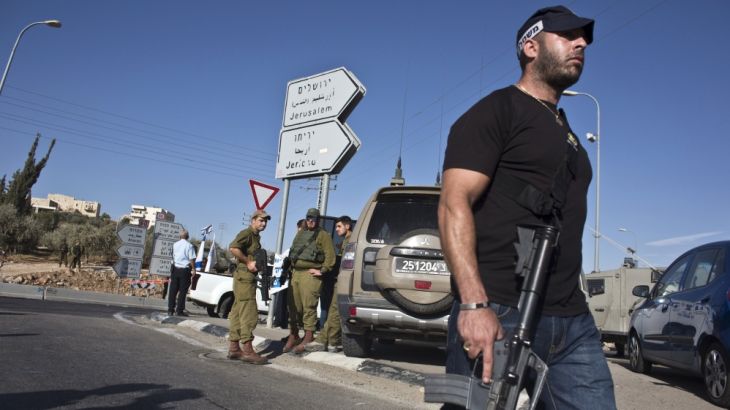Paranoia fuels mistaken identity killings in Israel
Israeli solders shoot dead Israeli Jew mistaken for Palestinian attacker in second accidental killing in a week.

Israeli soldiers have shot dead a Jewish Israeli man mistaken for a Palestinian attacker less than a week after an Eritrean refugee – also mistaken for a Palestinian attacker – was murdered.
A sense of paranoia has gripped Israel and the occupied territories in recent weeks amid renewed violence which has seen Israeli forces kill at least 52 Palestinians including unarmed protesters, bystanders and suspected attackers. Eight Israelis have died in Palestinian attacks.
|
|
| Personal weapons sales rise amid violence |
According to Israeli police spokesman Micky Rosenfeld, the victim of the latest killing late on Wednesday refused to provide the soldiers with his identity card, started to punch them and attempted to seize one of their weapons. He was shot dead on the scene.
Yehuda Meshi Zahav, a member of the ZAKA emergency medical team called to the scene, told the local Jerusalem Post he had also mistaken the man to be a Palestinian.
“I wanted to cover the body in a black bag [reserved for alleged attackers],” he said. “After I was asked to take care of the body I saw that he was a Jew, and that it was mistake to speak of a terrorist. I immediately notified the police and we switched to a white ZAKA body bag.”
RELATED: Israel ‘using excessive force’ on Palestinian children
With protests against Israel’s occupation spreading throughout the occupied West Bank, including East Jerusalem, and the Gaza Strip since October 1, Israeli forces have responded harshly, attacking demonstrators and imposing strict restrictions on Palestinian movement.
Wednesday’s killing came just days after Haftum Zarhum, an Eritrean asylum seeker, was killed after being shot by a security guard and lynched by an Israeli mob.
On Sunday night, Zarhum was shot by a security who had mistaken him for the accomplice of a Palestinian attacker. An Israeli rabbie, including a soldier, kicked him, beat him with chairs and slammed a bench on his head.
RELATED: Israel accused of ‘deliberately killing’ Palestinians
Earlier this month, an Israeli stabbed another Jewish man he had misunderstood to be a Palestinian in what he had intended to be a “revenge” attack. The victim was injured and hospitalised.
Asked what is behind the trend of mistaken identities, Majd Kayyal, media coordinator for the Adalah Legal Centre for Arab Minority Rights, said that Israeli society is hyperfocused on “its European identity”.
“The notion that all Jewish Israelis are a united nationality is false,” Kayyal told Al Jazeera, arguing that security forces associate Israeli identity as “white [and] European”.
Rights groups have also blasted Israeli leaders for calling on civilians to carry weapons amid more than 30 stabbing incidents against Israelis this month were allegedly carried out by Palestinians.
RELATED: Netanyahu ridiculed over mufti Holocaust comments
“The issue is that Israeli politicians gave clear orders to their people asking them to carry weapons – and anyone who commits any stabbing attack should be killed instantly,” Kayyal said.
“I would characterise that conversation as one that gave me a cautious measure of optimism that there may be … a way to defuse the situation and begin to find a way forward,” Kerry said.
“If parties want to try, and I believe they do, want to move to a de-escalation, there are a set of choices that are available.”